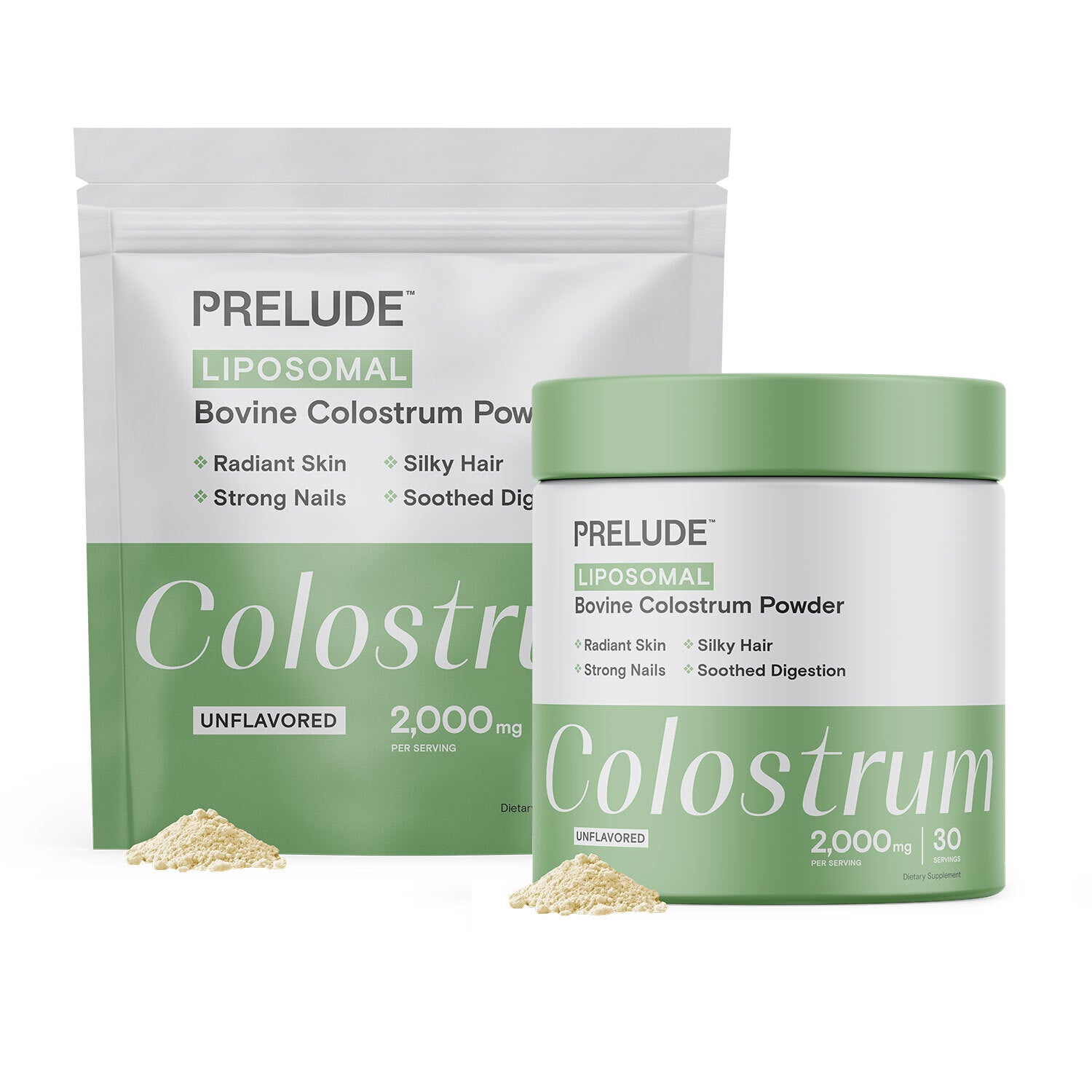
Can Colostrum Help With Bloating?
Bloating often leaves you feeling full, tight, and swollen in the abdomen, making even the simplest tasks seem daunting. You might have tried various remedies, from dietary changes to over-the-counter medications, but did you know that colostrum could be a natural way to alleviate this common digestive issue?
Colostrum, particularly bovine colostrum, is gaining attention for its potential benefits to gut health, including its ability to ease bloating. This initial form of milk produced by mammals after giving birth is packed with nutrients, growth factors, and antibodies that support overall health.
But when it comes to your stomach health, colostrum might just be the secret weapon you've been looking for.
4 ways colostrum benefits the digestive system
Bovine colostrum is rich in immunoglobulins, lactoferrin, growth factors, and a host of other bioactive compounds. These elements collectively support your immune system and promote tissue repair, making colostrum a powerful supplement for gut health.
When it comes to your digestive system, colostrum can have several positive effects:
1. Enhances Gut Barrier Function
Colostrum can be a powerful ally in reducing bloating by strengthening the gut lining. A healthy gut barrier is crucial because it helps keep toxins and harmful bacteria from entering your bloodstream, which can cause inflammation and bloating.
Colostrum’s growth factors play a key role in repairing and regenerating the gut lining, helping to keep it strong and intact. In fact, research by Playford et al. highlights how these growth factors in colostrum support gut health, making it particularly helpful for conditions like leaky gut syndrome and the bloating that often accompanies it.
2. Balances Gut Microbiota
Colostrum plays a vital role in maintaining a healthy balance of good bacteria in your gut, which is essential for proper digestion. When gut bacteria are out of balance, it can lead to digestive issues like bloating, gas, and discomfort. By promoting a healthy microbiome, colostrum helps prevent these problems from developing.
A review by Kelly highlights the positive effects of bovine colostrum on gut health, emphasizing its ability to support a balanced gut microbiota. This balance is key in preventing bloating and other digestive issues.
3. Reduces Inflammation
Colostrum contains powerful anti-inflammatory compounds that can help calm your digestive tract and reduce the inflammation leading to bloating.
A study by Pakkanen and Aalto underscores the anti-inflammatory properties of bovine colostrum, particularly its lactoferrin and immunoglobulins, which play a crucial role in reducing gut inflammation, a common cause of bloating.
4. Supports Nutrient Absorption
Poor nutrient absorption can make bloating worse, especially if your gut isn’t functioning at its best. Colostrum helps by promoting a healthy digestive environment, enhancing nutrient absorption and ensuring your body gets the nutrients it needs without causing digestive discomfort.
A review by Godhia and Patel highlights how colostrum improves nutrient absorption, which can be key in preventing bloating related to malabsorption issues.
How long does colostrum take to help the gut?
When you start taking colostrum supplements, you might wonder how quickly you'll begin to see results, especially if you're dealing with uncomfortable bloating. The timeline can vary depending on your specific digestive health and how your body responds to colostrum.
Some people notice improvements in their gut health within just a few days to a week of consistently using colostrum. However, for more significant and lasting benefits, it’s important to take colostrum supplements regularly for several weeks or even months.
Consistency is key—regular use allows your body the time it needs to heal and rebuild the gut lining, balance your microbiota, and reduce inflammation.
If you’re using colostrum specifically to address bloating, it’s also important to consider other factors like diet, stress levels, and lifestyle habits that might contribute to your symptoms. While colostrum can be a powerful tool for gut health, it’s most effective when used as part of a comprehensive approach to digestive wellness.
Other benefits of colostrum
While colostrum is an excellent choice for supporting your stomach health and reducing bloating, its benefits extend far beyond the digestive system. Here are a few other ways colostrum can enhance your overall health:
Boosts Immune Function
Colostrum is packed with immunoglobulins—antibodies that help your body fight infections. By boosting your immune system, colostrum not only helps you stay healthy but also supports quicker recovery from illnesses.
While primarily focused on immune health, a study by Brinkworth and Buckley also highlights colostrum's positive effects on overall gut health, which can indirectly help alleviate bloating.
Promotes Muscle Growth and Recovery
The growth factors in colostrum are not only good for your gut but also for your muscles. Athletes and fitness enthusiasts often use colostrum to aid in muscle recovery and improve physical performance.
Supports Healthy Skin
Colostrum's growth factors and nutrients can also benefit your skin by promoting collagen production, reducing inflammation, and aiding in the repair of skin tissue. This can result in healthier, more youthful-looking skin.
Enhances Joint Health
If you suffer from joint pain or stiffness, incorporating colostrum into your routine may help. Colostrum's anti-inflammatory compounds can reduce joint inflammation, alleviating your pain, swelling, and stiffness. This can lead to improved joint mobility and may even slow joint degeneration over time.
Aids in Weight Management
Some studies suggest that colostrum may support your weight management efforts by promoting a healthy metabolism and reducing inflammation. The bioactive compounds in colostrum can help boost your body's ability to burn calories and maintain energy balance. By reducing chronic inflammation, colostrum may also help prevent the hormonal imbalances that can lead to weight gain, making it a useful addition to your weight management plan.
How to take colostrum
If you're interested in trying colostrum to improve your gut health and reduce bloating, it's essential to know how to take it effectively. Colostrum supplements are available in various forms, including powders and gummies. The form you choose will depend on your personal preference and the product's specific instructions.
Here are some general guidelines to help you get started:
- Read Product Instructions Carefully: Each colostrum supplement may have different dosing recommendations. Always follow the manufacturer's instructions on the label to ensure you're taking the correct amount.
- Start with a Low Dose: If you're new to colostrum supplements, it's a good idea to start with a lower dose and gradually increase it. This allows your body to adjust to the supplement and reduces the risk of any potential side effects.
- Take on an Empty Stomach: For optimal absorption, it's often recommended to take colostrum on an empty stomach, either 30 minutes before a meal or two hours after eating. This helps ensure that your body can fully absorb the nutrients without interference from other foods.
- Consider a Powder Form: If you prefer flexibility in dosing, colostrum powder may be a good option. You can mix it into water, smoothies, or other beverages. Just be sure to mix it thoroughly to avoid clumping.
- Consistency is Key: To see the best results, take colostrum consistently, as part of your daily routine. Remember that colostrum's benefits, especially for gut health, may take time to manifest, so patience and regular use are crucial.
Incorporating colostrum supplements into your routine can be a simple yet effective way to support your stomach health and alleviate bloating. With its wide range of benefits, colostrum offers a natural solution to many of the digestive issues that can disrupt your daily life.
References
Playford, R. J., Macdonald, C. E., & Johnson, W. S. (2000). Colostrum and milk-derived peptide growth factors for the treatment of gastrointestinal disorders. *The American Journal of Clinical Nutrition*, 72(1), 5-14.
Pakkanen, R., & Aalto, J. (1997). Growth factors and antimicrobial factors of bovine colostrum. *International Dairy Journal*, 7(5), 285-297.
Kelly, G. S. (2003). Bovine colostrum: a review of clinical uses. *Alternative Medicine Review*, 8(4), 378-394.
Godhia, M. L., & Patel, N. (2013). Colostrum - its composition, benefits as a nutraceutical - A review. *Current Research in Nutrition and Food Science Journal*, 1(1), 37-47.
Brinkworth, G. D., & Buckley, J. D. (2003). Concentrated bovine colostrum protein supplementation reduces the incidence of self-reported symptoms of upper respiratory tract infection in adult males. *European Journal of Nutrition*, 42(4), 228-232.
















